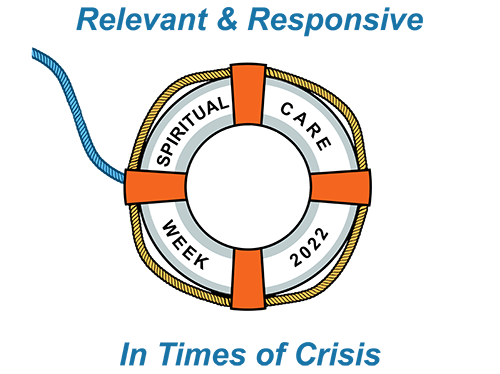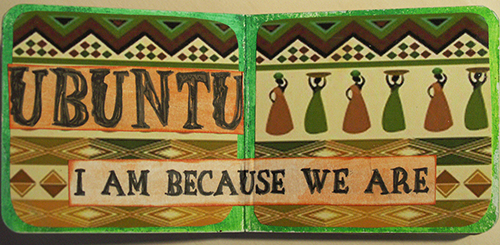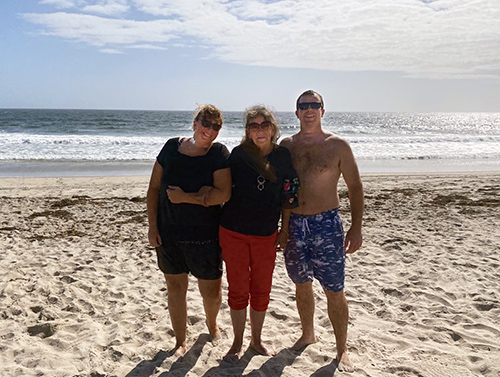How can we help?
888-283-1722
Call us now at 888-283-1722
24/7 Referrals and Nursing Support
Voices of Care Blog

Catch the Light: Chaplaincy and Mental Health
Posted on October 24, 2023 by Mary Ann Christie Burnside, Ed.D., M.Div.Note: We publish this article in observance of Spiritual Care Week.
Have you ever placed a “rainbow catcher” in your window? It’s a small crystal object that takes on pure light and reflects it back in a visibly different way. Like the crystal rainbow catcher, spirituality is prismatic. It has many sides that can reflect very different things yet is something contained.
Spirituality is whole unto itself and already whole within us; it is an organizing dimension of human experience (from which we make sense of things, are creative and animated, and act). Anything and everything in life can be viewed from its prism. Like spirituality, mental health is integral to life. And like spirituality, mental health can often be overlooked or separated out as if it were not the ground that shapes how we think, feel, behave, and experience this mortal life.
Suffering with mental health issues
The spiritual truth of innate wholeness regularly bumps up against the human truths of pain and suffering. Every life contains suffering—emotional, psychological, and spiritual. Whereas suffering of the physical kind is often visible, suffering in the realm of mental health is often invisible. As chaplains, we know that any kind of suffering can diminish our felt sense of wholeness, yet with mental health there is something more. Suffering with mental health symptoms, conditions, or diagnoses carries a sharp social stigma that can bring debilitating shame and increased suffering to a person already in pain. There is much work to be done in our communities and in the world to lessen stigma, discrimination, and ignorance and to increase education, support, care, and healing for all those living with mental health challenges and conditions.
Chaplains can do some of this work. In any given chaplaincy encounter, we could say that there are two or more people having a spiritual experience, though I suggest it is more like this: two or more “spiritual beings having [the] human experience” of navigating suffering and cultivating healing, together. We know that suffering and healing exist on a continuum, and that mental health is part of health, rather than distinct from it, just as chaplaincy is part of care. Although suffering, in any form, is often viewed as a problem, from the prism of spirituality it can be a sacred thing. What if we approached life, with all its “slings and arrows” (as my dad was fond of saying), with an understanding, or a hope, that we are already whole and that all things can be sacred, especially our suffering? What could we learn about ourselves, others, and the suffering that we face even if we (like my mom) would prefer to live a life without any pain at all?
There is no single answer here, though I offer one possibility based on my experience as a daughter, mother, scholar, chaplain, and person who also lives with the truth of suffering. I think we might remember and sense our wholeness. We might come to understand that healing is always possible, that healing is connected to meaning, and that the construction of meaning is something we engage in most profoundly in the face of suffering.
Healing is always possible
Chaplains often hold this perspective: That wholeness is part of our being, every being, and that even as things may not be fixed or cured, healing is always possible and is especially powerful when there is no cure or fix as is true when a person nears end-of-life. Suffering can be, and often is, an essential part of healing. Although physical suffering can often be managed with medicine, the effects of psycho-social suffering—including mental health and spiritual distress—must be managed with more than that.
As humans, we experience life and death relative to how well our needs are met. Unmet mental health or spiritual needs can increase both psycho-social and physical suffering. Suffering at end-of-life can include many thoughts, physical sensations, and feelings of sadness, fear, anger, regret, anxiety, depression and more. When a chaplain sits with a person who is suffering, we also sit with the suffering. As we get to know a person and their suffering, we begin the healing process. For example, in our accompaniment of others, we witness how suffering can bring a felt sense of brokenness, especially in the realm of mental health. Here, we can support a person not only by holding space for their felt sense of brokenness but by reminding them, too, of the truth of wholeness. Moreover, when people are suffering, they often experience loneliness and isolation, even in a room full of people. When we are caught in our thoughts and feelings, in our fears and anxieties, we can miss the support of those who love us, and those who provide much needed care. When we, as chaplains, embody a ministry of presence that attends to people up-close, in a tender, individualized way, we cultivate or co-create an experience of connection, healing, and wholeness – often when it is most needed. In the moment, this accompaniment can lessen loneliness, anxiety, and fear; over time it can support a person’s coping experience and enhance quality of life even as death approaches.
It's important to remind ourselves that we do not engage in healing or live fully without others. Those who suffer and those who witness suffering get through this life with accompaniment and support. As social creatures, we all need the beauty of connection to experience authentic joy, pain, and everything in between.
Suffering will likely cast itself onto a life in many shapes and colors, just as the crystal in the window casts light into a room, though I maintain that suffering always reflects the truth of life and of healing. As chaplains we listen to what we hear and for what’s not being said. We look at what we see and explore or encounter the invisible. As compassionate, nonjudgmental companions to those living with pain and distress, we seek to understand a person’s experience, to give it light and voice, to reflect it back. By bearing witness through this therapeutic relationship, we show each person that they are seen, heard, and cared for. We offer consolation in times of desolation by living into what Ram Dass once famously taught: “We are all just walking each other home.”
About the author
Mary Ann Christie Burnside, Ed.D., M.Div., is a professional health care chaplain and Manager of Pediatric Palliative Care with Care Dimensions. She is a postulant for ordination in The Episcopal Church and has over 20 years of experience bringing spiritual formation and wellness experiences to adults, children, and families in secular, school- and faith-based settings.
Additional Posts
Pandemic Reflection: Spiritual Counselors Do What it Takes to Create a Sacred Space
Posted on October 24, 2022 by Rev. Beth Loughhead, M.Div.In recognition of Spiritual Care Week and its theme, "Relevant and Responsive in Times of Crisis," Care Dimensions Spiritual Counselor Beth Loughhead recalls the extraordinary measures taken to create a sacred space for hospice patients, families, and co-workers during the COVID-19 pandemic. ...
Continue readingUsing the Spirit of Ubuntu in Patient Care
Posted on April 25, 2022 by Amy CiancarelliDuring Patient Experience Week and every week, let us appreciate and nurture the relationships we have with one another and know that we are better together. ...
Continue reading8 People I’ll Remember From 2021
Posted on December 31, 2021 by Lisa Conti in HospiceEight people who were interviewed about their experience with Care Dimensions brought some positive moments during a trying year. ...
Continue readingAnyone—patient, family, care provider—can make a referral. Fill in the form online or call us today.
Since 1978, Care Dimensions, formerly Hospice of the North Shore, has provided comprehensive and compassionate care for individuals and families dealing with life-threatening illnesses. As the non-profit leader in advanced illness care, we offer services in over 100 communities in Massachusetts.
Copyright 2026 | Care Dimensions, 75 Sylvan Street, Suite B-102, Danvers, MA 01923 | 888-283-1722 | 978-774-7566 |









